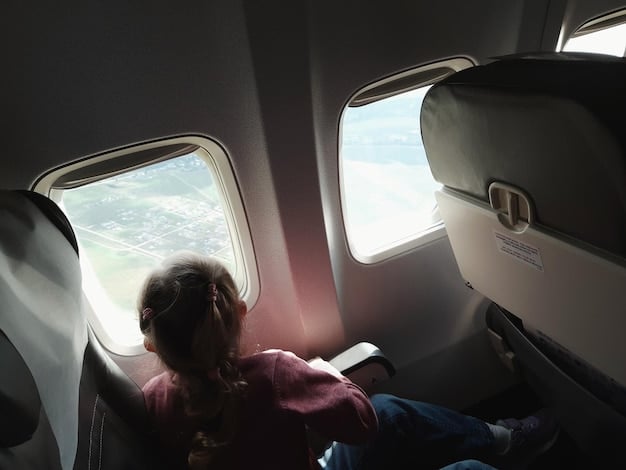US Airline Passenger Rights 2025: What Travelers Need to Know

As the US government evaluates potential new airline passenger rights for 2025, travelers should understand proposed protections aimed at enhancing compensation, transparency, and service standards, fundamentally altering the flying experience.
Flying has always been a blend of excitement and apprehension, a convenient means of travel often marred by unforeseen disruptions. For consumers in the United States, the perennial question of fair treatment during air travel has consistently been a point of contention. Against this backdrop, the question “Is the US Considering New Airline Passenger Rights in 2025? What Travelers Need to Know Now” looms large, signaling a potential shift in how airlines interact with their passengers.
The Current Landscape of US Airline Passenger Protections
Before delving into potential future changes, it’s crucial to understand the existing framework governing airline passenger rights in the United States. Unlike some international counterparts, the U.S. traditionally adopts a more market-driven approach, relying significantly on airline contracts of carriage rather than extensive government mandates.
Historically, the Department of Transportation (DOT) has played a pivotal role in consumer protection within the aviation sector. Their regulations predominantly cover areas such as tarmac delays, overbooking compensation, and specific rules for passengers with disabilities. However, many common grievances, such as delays not caused by tarmac issues, cancellations, or lost baggage, often fall under the purview of individual airline policies, leading to a patchwork system that can be confusing for travelers.
Key Existing Protections and Their Limitations
The DOT provides some foundational protections, but these often have specific conditions and limitations that many travelers may not fully grasp:
- Tarmac Delay Rule: Airlines are prohibited from keeping passengers on the tarmac for more than three hours for domestic flights and four hours for international flights without providing an opportunity to deplane. This rule was a significant step, yet it doesn’t address delays happening before boarding or after deplaning.
- Bumping (Overbooking): If you are involuntarily denied boarding due to overbooking, airlines must provide monetary compensation. The amount depends on the length of the delay and the cost of your ticket, but it’s important to note that voluntary bumping often leads to airline vouchers, which can be less flexible.
- Lost or Damaged Baggage: Airlines are liable for lost, damaged, or delayed baggage, with a maximum liability limit set by federal regulations (currently around $3,800 for domestic flights). However, proving the value of lost items and navigating the claims process can be a lengthy ordeal.
These present rules, while offering some recourse, often leave significant gaps. For instance, there’s no federal requirement for airlines to compensate passengers for flight delays or cancellations unless the delay is specifically due to tarmac issues. This means that if your flight is canceled due to mechanical issues or crew shortages, your compensation typically depends on the airline’s goodwill or specific contract provisions, which vary wildly.
The consumer experience under the current setup can be frustrating. Without clear, standardized federal mandates, passengers often find themselves at the mercy of airline-specific terms, leading to inconsistent application of rights and significant hurdles in seeking redress. This variability has been a core driver for calls for more comprehensive passenger protection, setting the stage for the discussions around new provisions for 2025.
Drivers Behind the Push for Enhanced Rights in 2025
The conversation around strengthening airline passenger rights in the US isn’t new, but it has gained significant momentum in recent years. Several factors are converging to create a compelling case for regulatory reform, positioning 2025 as a potential watershed moment for travelers.

Increased Passenger Frustration and Public Pressure
The post-pandemic travel surge, coupled with staffing shortages, technological glitches, and severe weather events, has unveiled systemic vulnerabilities within the airline industry. Millions of passengers have experienced unprecedented levels of flight disruptions, including widespread cancellations, lengthy delays, and lost baggage, leading to a surge in complaints to the DOT and widespread media coverage.
The sheer volume of these incidents has elevated public awareness and frustration. Social media platforms amplify individual grievances, creating a collective voice that demands accountability and better protection. This public outcry has translated into significant political pressure on lawmakers to act, making airline consumer rights a prominent issue on the legislative agenda.
Lessons from International Models
The US system often stands in stark contrast to more robust passenger protection frameworks found in other regions, most notably the European Union (EU) with its EC 261 regulation. EC 261 mandates significant compensation for passengers experiencing delays, cancellations, or denied boarding, often regardless of the reason for the disruption, unless extraordinary circumstances apply.
Observers and consumer advocates frequently point to the predictability and greater pro-consumer stance of these international models. The EU’s regulation, for example, sets clear, enforceable financial compensation thresholds, which reduces ambiguity and provides passengers with greater certainty. The success and perceived fairness of these models serve as a template and an aspiration for those advocating for similar protections in the US, highlighting areas where the American system could be significantly improved.
Government Oversight and Policy Initiatives
The Biden administration and the current DOT, under Secretary Pete Buttigieg, have explicitly prioritized airline consumer protection. There has been a clear rhetorical and practical shift towards holding airlines more accountable. Recent actions, such as the proposed rule requiring airlines to provide automatic refunds for canceled or significantly delayed flights, signal a proactive approach.
Furthermore, bipartisan efforts in Congress have emerged, with various proposed bills aiming to codify and expand passenger rights. These legislative pushes, sometimes differing in their specifics but united in their intent, reflect a growing consensus that the current voluntary and contract-based protections are insufficient. The combination of sustained public pressure, the demonstrable success of international protective frameworks, and a committed governmental focus creates a fertile ground for the enactment of significant new airline passenger rights by 2025.
Key Areas Under Consideration for New Rights
Discussions around new airline passenger rights in the US are broad, but several key areas consistently emerge as primary targets for enhanced consumer protection. These proposals aim to address the most common pain points for travelers, moving beyond the current reactive approach to a more proactive and standardized system of compensation and care.
Mandatory Compensation for Delays and Cancellations
Perhaps the most significant proposed change is the introduction of mandatory compensation for significantly delayed or canceled flights. Currently, as noted, unless it’s an overbooking situation or a tarmac delay, airlines are generally not federally mandated to compensate passengers for disruptions. The new proposals often push for a system similar to the EU’s EC 261, where passengers would receive financial compensation based on the length of the delay or cancellation, regardless of fault (excluding extraordinary circumstances like severe weather).
Such a rule would fundamentally shift the burden, incentivizing airlines to minimize disruptions and providing immediate, tangible relief to affected passengers. It would also standardize compensation, moving away from the often arbitrary and inconsistent goodwill gestures currently offered by individual airlines.
Automatic Refunds and Vouchers
Another critical area under review is the clarity and immediacy of refunds. While airlines are generally required to provide cash refunds for canceled flights or significant schedule changes where the passenger chooses not to travel, the process can often be slow and cumbersome. There have been numerous complaints about airlines issuing vouchers instead of cash or delaying refunds for extended periods.
New proposals aim to mandate automatic, timely cash refunds for cancellations and significant service changes, preventing airlines from unilaterally issuing vouchers unless explicitly agreed upon by the passenger. This would offer greater financial certainty and flexibility to travelers who have paid for a service they did not receive.
Enhanced Passenger Care During Disruptions
Beyond financial compensation, there’s a strong push to standardize “duty of care” during disruptions. Currently, what an airline provides in terms of meals, accommodation, and transportation during extended delays or overnight cancellations varies widely. Some airlines offer comprehensive support, while others provide minimal assistance.
New regulations could establish minimum requirements for services like hotel accommodation, meal vouchers, and ground transportation for passengers stranded due to airline-caused delays or cancellations. This would ensure a baseline level of comfort and support, reducing the emotional and logistical stress on travelers caught in disruptive situations.
- Clear Communication Standards: Mandates for real-time, transparent communication about delays, cancellations, and rebooking options via multiple channels (email, text, app).
- Accessibility Protections: Strengthening rules for passengers with disabilities, including better handling of mobility aids, improved boarding/deplaning assistance, and training for airline staff.
- Baggage Handling Improvements: Stricter rules and increased liability limits for lost, delayed, or damaged luggage, potentially with faster claims processing.
These contemplated changes signal a comprehensive effort to elevate the American traveler’s standing, aiming to create a more equitable and predictable flying experience. The implementation of these measures would necessitate significant operational adjustments for airlines but promise substantial benefits for consumers.
Potential Impact on Airlines and Travelers
The introduction of sweeping new airline passenger rights in the US would undoubtedly ripple throughout the aviation industry, affecting both airlines and travelers in significant ways. While the general sentiment is that these changes favor the consumer, the economic and operational implications for airlines are considerable.
For Airlines: Operational and Financial Realities
From an airline perspective, enhanced passenger rights, particularly those involving mandatory compensation, represent a substantial financial burden. Airlines often operate on thin margins, and large-scale payouts for delays and cancellations could severely impact their profitability. This could lead to several potential responses:
- Increased Ticket Prices: To offset the increased costs of compliance and potential compensation, airlines might raise ticket prices. This would effectively pass some of the financial burden onto the consumer, albeit in a different form.
- Operational Adjustments: Airlines might invest more heavily in operational resilience. This could include adding more buffer time in schedules, increasing standby crew numbers, investing in better maintenance to prevent mechanical failures, and upgrading technology to improve communication and rebooking efficiency.
- Reduced Flexibility: Some argue that stricter rules could reduce airlines’ operational flexibility, making it harder to make last-minute adjustments or accommodate unforeseen circumstances without incurring heavy penalties. This could potentially lead to fewer flights on certain routes or reduced frequency.
- Consolidation: Smaller or financially weaker airlines might struggle to comply with new, costly regulations, potentially leading to increased consolidation within the industry as larger carriers absorb them or as they cease operations.
It’s a delicate balance: lawmakers want to protect consumers, but they also need a viable airline industry. The exact provisions and their implementation timeline will largely determine the severity of these impacts.
For Travelers: Enhanced Protections and Potential Trade-offs
For the average traveler, the direct benefits of new passenger rights are clear and compelling:
- Greater Peace of Mind: Knowing that there are clear, enforceable rules for compensation and care during disruptions can significantly reduce the stress associated with air travel.
- Improved Service Standards: Airlines would be incentivized to improve their on-time performance, customer service, and communication, as failures would carry greater financial penalties.
- Fairer Treatment: The standardization of compensation and care means less reliance on airline goodwill, ensuring a more equitable experience for all passengers.
- Quicker Resolution: Clearer rules for refunds and claims processing should lead to faster resolution of issues.
However, travelers might also face some trade-offs. As mentioned, potentially higher ticket prices could be a result. There’s also the argument that a highly regulated environment could stifle innovation or reduce the overall number of flight options if airlines become more cautious about expanding routes due to increased risk. Ultimately, the goal is to strike a balance where enhanced consumer protection doesn’t inadvertently lead to a less accessible or less diverse air travel market.
Navigating the Legislative Process: A Look Ahead to 2025
Bringing about significant changes to airline passenger rights in the US is a complex undertaking, requiring navigation through a multifaceted legislative and regulatory landscape. While 2025 is a target for potential implementation, the path to enactment is fraught with various hurdles and influences.
The Role of Congress and Federal Agencies
New passenger rights legislation typically originates in Congress, where bills are introduced, debated, and voted upon. Several proposals are already gaining traction, each with different scopes and specific provisions. For a bill to become law, it must pass both the House of Representatives and the Senate and then be signed by the President. This process can be lengthy, involving committee hearings, amendments, and compromises to garner sufficient bipartisan support.
Simultaneously, the Department of Transportation (DOT) plays a crucial role. Even without new legislation from Congress, the DOT has the authority to issue new regulations under existing statutes. Recent DOT actions, like proposed rules on automatic refunds, demonstrate this regulatory power. If Congress doesn’t pass comprehensive legislation, the DOT might continue to fill gaps through its rulemaking processes.
Lobbying Efforts and Industry Influence
The airline industry is a powerful lobbying force in Washington D.C. Airlines and their trade associations (like Airlines for America) actively engage with lawmakers and regulators, advocating for policies that minimize financial burdens and operational constraints. They often argue that excessive regulation could harm the industry’s ability to compete, innovate, and provide affordable air travel, potentially leading to job losses and reduced connectivity.
Conversely, consumer advocacy groups, labor unions, and individual citizens exert pressure for stronger protections. These groups provide lawmakers with data on consumer complaints, personal testimonies, and comparisons to international standards, trying to counterbalance the industry’s influence. The interplay between these competing interests significantly shapes the final legislation or regulation.
Public and Political Will
Ultimately, the speed and scope of new rights depend heavily on sustained public and political will. High-profile incidents of airline disruptions tend to galvanize public opinion and pressure lawmakers to act decisively. However, as public attention shifts, the urgency for reform might wane, potentially slowing down legislative progress.
The upcoming election cycles and the political climate will also play a role. A strong mandate for consumer protection could accelerate the process, while a divided government or a shift in administrative priorities could create roadblocks. While the momentum for change is palpable ahead of 2025, the legislative journey is rarely straightforward, promising continued debate and potential modifications to any proposed rights.
How Travelers Can Prepare and Stay Informed
As the potential for new airline passenger rights in the US draws closer to 2025, proactive engagement and informed decision-making will be key for travelers. While the specifics of any new legislation are not yet finalized, there are concrete steps you can take to prepare and ensure you are aware of your evolving rights.
Stay Connected and Monitor Official Sources
The most crucial step is to stay informed. Several reliable sources track legislative developments and announcements concerning airline consumer protection:
- Department of Transportation (DOT) Website: The official DOT website, particularly its “Aviation Consumer Protection” section, is the primary source for current and proposed rules. They regularly publish updates, consumer advisories, and enforcement actions.
- Consumer Advocacy Websites: Organizations like Travelers United, Consumer Reports, and various airline watchdog groups often provide plain-language explanations of complex regulations and advocate for passenger rights.
- Reputable News Outlets: Follow major news organizations that cover business, travel, and consumer affairs. They often provide timely analyses of proposed legislation and regulatory changes.
Subscribing to newsletters or setting up news alerts for terms like “airline passenger rights,” “DOT regulations,” or “travel consumer protection” can ensure you receive updates as they happen.
Understand Existing Rights and Documentation
Even as new rights are discussed, it’s vital to fully understand your current protections. Familiarize yourself with the DOT’s existing rules on tarmac delays, overbooking, and baggage liability. Equally important is to review the “Contract of Carriage” for any airline you plan to fly with. This legal document, usually available on the airline’s website, outlines their specific policies regarding delays, cancellations, refunds, and rebooking in various scenarios.
When booking, consider using credit cards that offer travel protection benefits, such as trip delay insurance, cancellation coverage, or baggage loss protection. These can provide an extra layer of financial security that may exceed government-mandated compensation.
Practical Steps for Future Travel
Beyond staying informed, adopting certain practices can help you navigate potential disruptions, regardless of future policy changes:
- Travel Insurance: For significant trips, especially international ones, consider comprehensive travel insurance. Policies can cover a wider range of issues, from medical emergencies to extensive trip interruptions and cancellations due to unforeseen circumstances.
- Documentation: Always keep detailed records of your travel plans, including flight numbers, booking confirmations, and any corresponding communication with the airline regarding delays or cancellations. If a disruption occurs, document everything: take screenshots of delay notifications, note down agent names and conversation details, and keep receipts for any unexpected expenses.
- Complaint Process: Familiarize yourself with the formal complaint process for both the airline and the DOT. If you feel your rights have been violated, filing an official complaint with the DOT can sometimes prompt action, and it helps the agency identify recurring issues.
By taking these steps, travelers can not only be better prepared for changes in 2025 but also empower themselves to navigate the complexities of air travel with greater confidence and protection, regardless of the evolving regulatory landscape.
International Precedents and Their Influence on US Policy
The discourse on new airline passenger rights in the United States is significantly shaped by existing international frameworks. Policymakers and consumer advocates often look to models like the European Union’s EC 261, Canada’s Air Passenger Protection Regulations (APPR), and even specific regulations in countries like Brazil, as benchmarks for what comprehensive passenger protection can entail.
The European Union’s EC 261: A Model for Compensation
Regulation EC 261 is arguably the most well-known and often cited example of robust passenger rights. Enacted in 2004, it mandates financial compensation for passengers experiencing delays of three or more hours, cancellations, or denied boarding, provided the disruption is within the airline’s control. The compensation amounts are fixed (€250, €400, or €600) based on flight distance and delay length.
EC 261 also requires airlines to provide “right to care” provisions, including meals, refreshments, and hotel accommodation (if an overnight stay is necessary) during extended delays. Its clear structure and emphasis on automatic financial redress offer a distinct contrast to the US system, making it a primary point of reference for those pushing for similar, more expansive protections in America.
Canada’s Air Passenger Protection Regulations (APPR)
Introduced more recently in 2019, Canada’s APPR represents a graduated approach to passenger rights, often seen as a hybrid between the EU and US models. It sets out specific compensation amounts for delays and cancellations, depending on the reason for the disruption (within airline control, within airline control but required for safety, or outside airline control) and the size of the airline.
The APPR also mandates airlines provide standards of treatment, such as food, drink, and accommodation, and requires clear communication about disruptions. While it has faced some criticism and legal challenges, its existence demonstrates a North American country’s willingness to implement a more detailed and compensation-driven framework, influencing discussions south of the border.
Lessons for the US Approach
The influence of these international precedents on US policy discussions is multi-faceted:
- Proof of Concept: They demonstrate that robust passenger protection frameworks can be implemented and function, albeit with industry adjustments.
- Benchmarking: They provide concrete examples for compensation thresholds, duty of care provisions, and communication requirements, offering specific language and regulatory structures that could be adapted for the US context.
- Competitive Pressure: As US airlines operate globally, they often already comply with these stricter international rules when flying to and from those regions. This makes the argument for uniform domestic standards more compelling, reducing a “two-tier” system of passenger treatment.
While the US is unlikely to adopt any foreign regulation wholesale, the principles and specific mechanisms from these international precedents are closely examined. They serve as compelling arguments for what is possible and necessary to elevate the standard of passenger rights in the United States by 2025.
| Key Point | Brief Description |
|---|---|
| ✈️ Current Protections | Limited, focusing on tarmac delays and overbooking via DOT rules and airline contracts. |
| 💡 Drivers for Change | Increased disruptions, international models, and strong government/public pressure. |
| 💰 Proposed Rights | Mandatory compensation for delays/cancellations, automatic refunds, better passenger care. |
| 🌍 Global Influence | EU’s EC 261 and Canada’s APPR serve as key precedents for US reforms. |
Frequently Asked Questions About US Airline Passenger Rights
▼
Current US rights primarily cover tarmac delays (limiting how long passengers can be kept on the plane) and involuntary denied boarding due to overbooking, for which monetary compensation is mandated by the Department of Transportation. Other issues, like general delays or cancellations, largely depend on individual airline policies.
▼
New rights are being considered due to a surge in flight disruptions, increased passenger complaints, and the desire to align US standards more closely with robust international regulations like the EU’s EC 261. There’s significant public and governmental pressure for stronger consumer protections.
▼
Proposed new rights include mandatory financial compensation for significant delays and cancellations (not currently required), automatic and timely cash refunds for canceled flights, and enhanced “duty of care” provisions like guaranteed meals, refreshments, and accommodation during extended disruptions caused by the airline.
▼
Airlines may potentially raise ticket prices to offset the increased operational costs and financial liabilities associated with mandatory compensation and enhanced passenger care. Any price adjustments would aim to cover the financial implications of complying with stricter regulations.
▼
Travelers should stay informed by monitoring official DOT announcements and reputable news sources. Understanding your current rights and the airline’s contract of carriage is crucial. Consider travel insurance for added protection, and always document any flight disruptions thoroughly to aid potential claims.
Conclusion
The prospect of new airline passenger rights emerging in the US by 2025 signals a pivotal moment for air travel. Driven by persistent passenger frustrations and inspired by more encompassing international models, these potential changes aim to redefine the relationship between airlines and their customers. While the path to implementation involves complex legislative and industry negotiations, the focus on mandatory compensation, clearer refund policies, and enhanced passenger care during disruptions promises a more equitable and predictable flying experience. Travelers are encouraged to remain informed and proactive, empowering themselves with knowledge as these significant reforms take shape.





